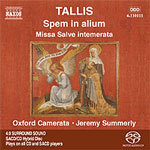
Spem in alium / Missa Salve intemerata
 $28.00
Out of Stock
$28.00
Out of Stock6+ weeks add to cart
THOMAS TALLIS
Spem in alium / Missa Salve intemerata
Oxford Camerata / Jeremy Summerly (conductor)
[ Naxos SACD / SACD ]
Release Date: Friday 1 July 2005
This item is currently out of stock. It may take 6 or more weeks to obtain from when you place your order as this is a specialist product.
Considering that Thomas Tallis was the finest English composer of his generation, it is surprising how little we know about his life. The first time we hear of Tallis is in 1530 when he was organist at Dover Priory in Kent: by then he was clearly a respected professional musician.
Hybrid/SACD - in 4.0 surround sound. Playable on all Compact Disc players
Rosette Recording Penguin Stereo Guide
"This is one of the most remarkable recordings of 2005 and is fully worthy of the celebration of the 500th anniversary of Tallis's birth. The performances here are beyong praise."
(Penguin Stereo Guide)
Considering that Thomas Tallis was the finest English composer of his generation, it is surprising how little we know about his life. The first time we hear of Tallis is in 1530 when he was organist at Dover Priory in Kent: by then he was clearly a respected professional musician. We also know that Tallis was described as being 'very aged' in 1577 and that he died in November 1585. Taking these three pieces of information together, the consensus is that Tallis was born around 1505 (thus placing him in his mid-twenties while working at Dover, in his early-seventies when he was described as 'very aged', and in his eightieth year when he died). Hardly conclusive, but there is not much else to go on.
The motet Salve intemerata is a setting of a long prose prayer to the Virgin Mary and is written for five voices in an expansively Catholic style. We know nothing of Tallis's whereabouts when he wrote this large-scale motet, but we do know that the oldest manuscript in which the motet survives was copied in the late 1520s and that the words are recorded in a Book of Hours which appeared in 1527. Yet in spite of its early date, Salve intemerata shows Tallis writing music of considerable fluency and invention, quite an achievement for a composer in his early twenties. With a composition portfolio that contained a work as substantial and proficient as this one, it is not difficult to see why Tallis was appointed to Dover Priory as a young man.
In 1535 Dover Priory was dissolved, and Tallis's job with it. By 1537 he was working at the church of St Mary-at-Hill in London. St Mary-at-Hill was an important musical foundation, and from there Tallis seems to have begun his association with the English royal court (in 1577 Tallis was described as 'serving your royal ancestors for forty years'). It is at this time that the Missa Salve intemerata may have been written. The Mass borrows heavily from the motet, particularly in the Gloria and Credo, yet it shows that Tallis's style had matured in the intervening years. More concise, direct, and vocally more pragmatic than the lengthy motet, the Mass is his finest pre-Reformation achievement. The reason that the Missa Salve intemerata is not better known today is that one of the voice parts requires reconstruction (the Tenor part-book has been lost). Fortunately the missing part is the one directly above the lowest voice, the easiest one to reconstruct within this texture.
By 1538 Tallis was a senior member of the music staff at Waltham Abbey in Essex, but yet again Tallis's job dissolved along with the Abbey in 1540. Undeterred, he moved to the newly-founded secular establishment at Canterbury Cathedral, where he sang as part of the choir of twenty-two men and boys. The Reformation had a profound effect on English church music, most tangibly during the reign of Edward VI when late-medieval Latin polyphony, as exemplified by the Salve intemerata and its Mass, became outlawed. Tallis maintained his craft and his compositional voice, and provided the Church of England with largely homophonic music to English texts. He was, above all, a pragmatist, and he allowed the intimacy and directness of expression which this new style required to give another dimension to his compositional vision. Indeed, turbulent though this English liturgical revolution must have been to a lifelong Catholic, Tallis accepted the new musical order and learnt from it.
Tracks:
Spem in alium
Salve intemerata
Missa Salve intemerata
With all our heart
Discomfort them, O Lord
I call and cry to thee, O Lord



